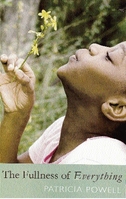Book Review: A powerful, poignant story
Published: Sunday | June 28, 2009

Contributed
Title: The Fullness of Everything
Author: Patricia Powell
Publisher: Peepal Tree Press
Reviewer: Barbara Nelson
Patricia Powell paints her word pictures in minute detail and in warm, rich colours. Not like the broad, bland strokes used by some writers. Instead, she takes delight in describing each and every person, location and situation in great detail. She does so very well.
"In the middle of the day when the sun is at its zenith, the light at its whitest, when there is no breeze at all stirring the world and all God's creatures have come to a complete full stop - the dog is fast asleep under the mango tree, its mouth bubbling with foam; the cat is curled up underneath the bed licking herself slowly and yawning ... they come to the willow trees at the bottom of the garden."
"They" are Winston, the main character in the book, and his mother.
Fateful call
At the beginning of the story, Winston, who left Jamaica 25 years before and now lives in the United States of America, makes a telephone call to his mother in Jamaica in the middle of the night. He does this in response to a telegram that came from her some days before.
The only thing is that Winston had made no contact with his family in the years since he left home.
On learning that his father is gravely ill and about to die, Winston returns reluctantly to Jamaica.
Winston is filled with rage and resentment towards his father. The anger had started from the time he was a child and it grew because his father used to beat him because he could not control him. So Winston returns to Jamaica accompanied by his girlfriend, Marie Jose, and is met at the airport by his estranged brother, Septimus (and his son), who drives them home in a long, black hearse. Septimus (Septi to his family) works at Rowe's Funeral Home.
On his first night at home, Winston notices a little girl in the home. She turns out to be his father's outside child. Winston's rage at this news erupts like a raging volcano. "You let him carry on with this?" he screams at Septi and cracks him in his face.
"You left like Quashie, ran away to America," brother Septi reminds him.
From there, the story unfolds in intricate detail. How Winston's mother, the tall, austere, proud, brown-skinned university-educated woman from St Ann had married his father who had nothing at all - "not even good teeth in his head and could barely read and write" - but he was a very confident person.
Her parents were not keen on him - he did not have colour - just the little scratch of rock in the country that he called arable land, but they (the parents) had to marry her off quick - "she was turning ripe on them".
father at Death's door
Powell pulls her readers into the powerful story of a family dominated by a father who was once strong and agile, but is now at death's door and "smells of Castile soap, of Dettol, now he smells like an open sore, a man rotted to the core".
The father had outside children, one was a mechanic known as Sammy, Velma's child. And there was another Sammy who worked in a bank and "whose ears jutted out of his head like wings" just like his father's.
But his wife stoically played the role as a faithful spouse. Septi's twin sister, Althea, died horribly in a car accident when she was young. And one night someone left a crying baby on their doorstep - another outside child - a baby who grew up to be the little girl, Rosa, who lived with them. Her own mother was a child who was barely into her teens.
Powell exposes the deep psychological wounds that the events had on each family member and how it affects other aspects of their lives. She mixes these events with magic and supernatural elements.
three perspectives
The story is told in three sections: from the perspectives of Winston, from Septimus and The Family. Through it all, there is the underlying theme that unforgiveness and resentment are corrosive and very divisive. But can the main characters ever overcome the breach in their relationship? What steps can they take, or do they want to take, to heal the fractured family and their own lives.
It is a powerful, poignant, unsentimental story - a must-read for those who appreciate good writing, the peculiarities and possibilities inherent in human relationships and the amazing capacity for love and forgiveness that can be found in each human heart.
Jamaican-born Patricia Powell lives in the United States and teaches at Stanford University in California. She is the award-winning author of three novels including A Small Gathering of Bones and The Pagoda.
